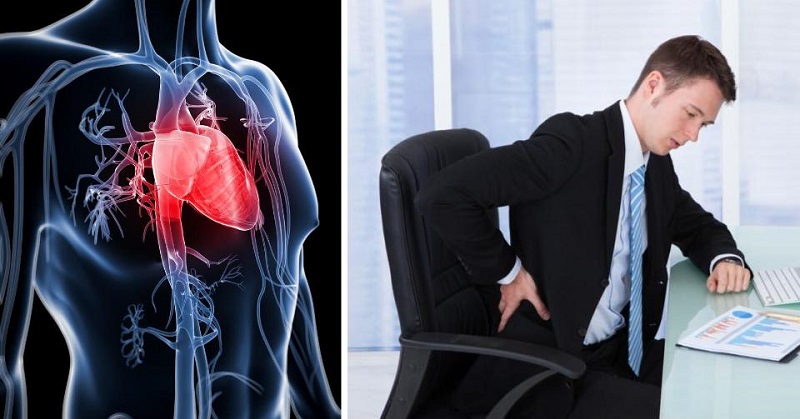Take a minute to add up how many hours a day you spend sitting. Factor in the amount of time you spend in the car each day, seated at a desk at work, sitting down to eat meals, watching T.V. and relaxing, etc. For most of us, the majority of our day may be spent sitting. So how is this effecting our health?
Health specialists explain that about 40% of their patients experience problems with their backs as a result of improper sitting and spending long hours on the computer. Hundreds of people are now seeking medical help, and most of them have jobs that require working on a computer for eight or more hours each day.

Research has linked sitting for long periods of time with a number of health concerns, including obesity and metabolic syndrome, which has many conditions including increased blood pressure, high blood sugar, excess body fat around the waist, and abnormal cholesterol levels.
Dr. James Levine, author of the book Get up! Why Your Chair is Killing You and What You Can Do About It, has dedicated a good part of his career to investigating the health effects of sitting. He found, simply put, that the human body was designed to be active and on the move all day long. When you stop moving for extended periods of time, you are telling your body to shut down.
So why shouldn’t you be sitting? Here are the results:
Organ Damage
- Heart: When you sit, blood flow slows and muscles burn less fat, which makes it easier for fatty acids to clog your heart, leading to a higher risk of heart disease.
- Pancreas: Your body’s ability to respond to insulin is affected even by one day of sitting in excess, leading your pancreas to produce increased amounts of insulin, which could lead to diabetes.
- Colon Cancer: Sitting for extended periods of time may increase your risk of colon, breast and endometrial cancers. (This could be due to excess insulin production, or weight gain.)
Poor Digestion
- Sitting down after you’ve eaten a meal causes your abdominal contents to compress, which slows down digestion. Sluggish digestion can lead to cramping, bloating, heartburn, and constipation.
Brain Damage
- Your brain function begins to slow when your body is sedentary for too long. Your brain will receive less fresh blood and oxygen, which are both needed to trigger the release of mood-enhancing chemicals.
Posture Problems
- It is common to hold your neck and head forward while working at a computer. This can lead to strains in your cervical vertebrae, along with permanent imbalances, which can cause neck strain, sore shoulders and a sore back.
- Sitting puts more pressure on your spine than standing. When you sit, the disks in your back are compressed and can lose flexibility over time, increasing your risk of herniated disks and other back problems.
Muscle Degeneration
- Standing requires you to tense your abdominal muscles, which go unused when you sit.
- Your hips suffer from prolonged sitting, becoming tight and limited in the range of motion. Decreased hip mobility in the elderly is the leading cause of falls.
Leg Disorders
- Sitting leads to poor circulation in your legs, which can cause swelling of your ankles, varicose veins and blood clots.
- Walking, running and engaging in other exercise leads to stronger and more dense bones. Lack of activity may result in weak bones and even cause osteoporosis.
So what can you do? Many of the above health problems can be helped by certain activities. Try rebounding to get your muscles and heart activated, and do some back exercises to support the spine.
Are You Still Sitting?
Did you know that you burn up to 30% more calories when you are standing verses when you are sitting? It is suggested that you stand or move around for one to three minutes for every half hour you spend sitting. If you are sitting for the majority of your day, here are a few ways to get moving:
- Stand or walk around while you are talking on the phone.
- If you need a desk to work, consider getting a standing desk, or improvise with a high table or a counter
- Take a walk on your lunch break.
- If you are watching T.V. to relax, get up and move around on commercial breaks.
This problem is affecting more than just adults at work. Children younger than 18 years old can begin to develop severe spinal deformities like kyphosis and scoliosis from watching cartoons or playing games on the computer for extended periods of time. Regardless of your age, get up and get moving! A more active lifestyle will lead to a healthier body and a lower risk for health problems.


